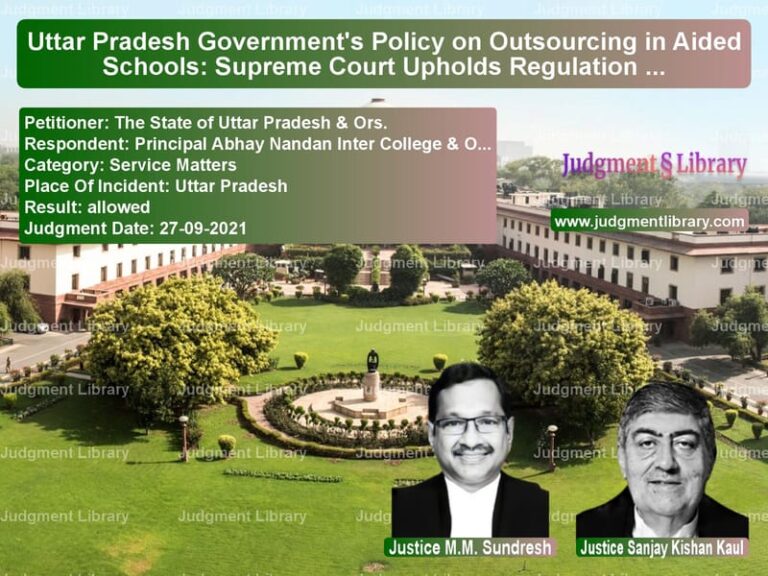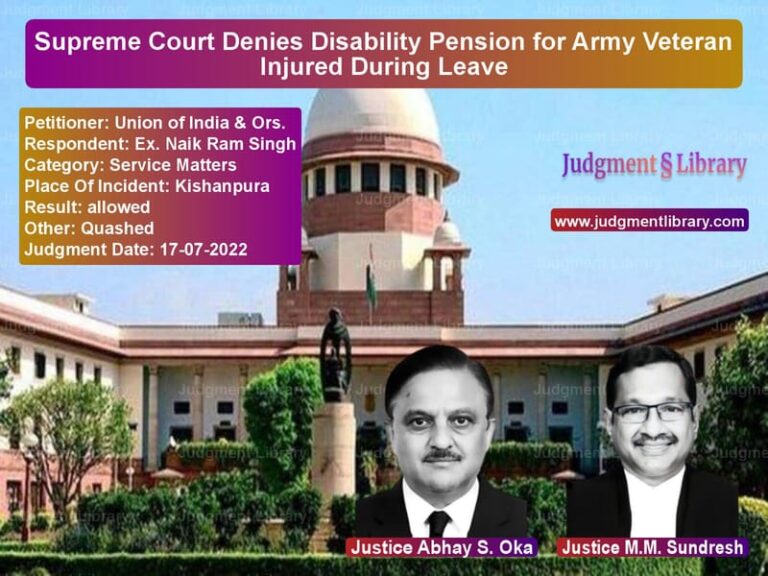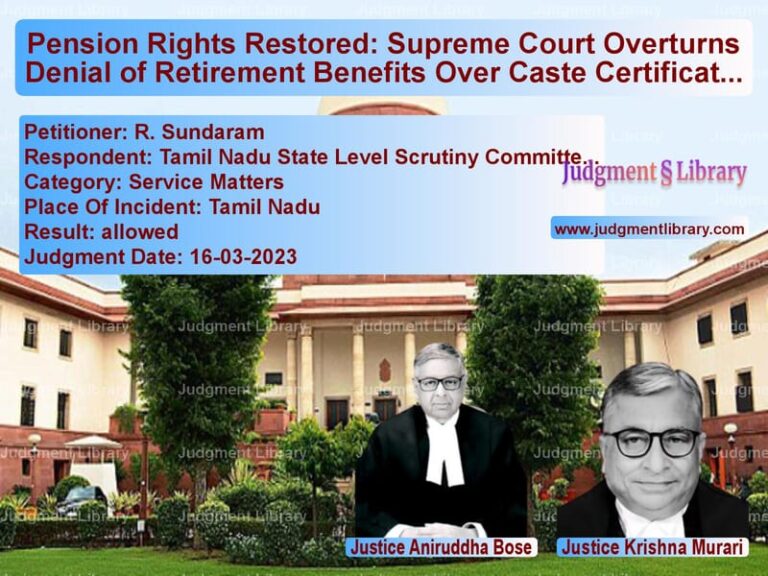Escorts Employees Union Membership Dispute: Supreme Court Ruling on Union Representation
The case of All Escorts Employees Union v. State of Haryana & Ors. involved a legal dispute concerning the membership of workers from the Yamaha Motor India Private Limited (formerly part of the Escorts Group) in the appellant union, All Escorts Employees Union. The Supreme Court, in its judgment dated September 14, 2017, addressed the issue of whether a trade union can represent workers from different industries, particularly when those industries have become separate entities. The Court upheld the rejection of the appellant union’s amended membership clause by the Registrar of Trade Unions.
Background of the Case
The appellant union, All Escorts Employees Union, was formed in 1968 and was a registered trade union representing employees of various establishments under the Escorts Group, including Escorts Ltd., Escorts Yamaha Ltd., Escorts JCB Ltd., and Escorts Hospital. In 2001, the Yamaha Motor India unit became a 100% subsidiary of Yamaha Motor Company, Japan, and workers in this unit were no longer part of the Escorts Group.
To bring the workers of Yamaha under the fold of the appellant union, the union amended its constitution in June 2001, allowing workers from any erstwhile Escorts concern to become members. The amendment was submitted to the Registrar of Trade Unions for approval, but the Registrar rejected it, stating that the workers of Yamaha could not be considered members of the appellant union due to the lack of commonality of interests. The appellant filed a writ petition in the High Court of Punjab & Haryana, challenging this decision, but the High Court upheld the Registrar’s decision. The appellant then approached the Supreme Court.
Legal Issues
- Can a trade union represent workers from different industries if those industries have separated from the original entity?
- Is the amendment to the union’s membership clause valid under the Trade Unions Act?
- Does the trade union’s representation rights extend to workers in a separate establishment that was once part of the same group?
Arguments by the Appellant (All Escorts Employees Union)
The appellant contended:
- The amendment to the union’s constitution was made to bring the workers of Yamaha back into the fold of the union, as they had previously been members before Yamaha’s separation from the Escorts Group.
- The workers of Yamaha continued to pay membership dues and were represented by the appellant union in negotiations with Yamaha’s management.
- The rejection of the amendment by the Registrar was unjustified and contrary to the principles of union rights under Article 19(1)(c) of the Indian Constitution, which protects the right to form associations.
- The union had a valid right to represent the workers of Yamaha as they were previously part of the same corporate group.
Arguments by the Respondents (State of Haryana & Yamaha)
The respondents countered:
- The amendment to the union’s constitution violated the provisions of the Trade Unions Act, which requires a trade union to have direct connectivity with the workers of the specific industry or establishment it represents.
- There was no commonality of interests between the workers of Yamaha and those in the other units of the Escorts Group.
- The workers of Yamaha had formed their own separate union, the Yamaha Motor Employees Union, which was recognized by Yamaha and registered with the Registrar of Trade Unions.
- The union’s actions were in contravention of the provisions of the Act, which mandates that a trade union must represent workers within a specific industry or establishment.
Supreme Court’s Analysis
On the Validity of the Amendment to the Union’s Constitution
The Supreme Court found that the union’s constitution amendment, which allowed workers of Yamaha to join, was not valid. The Court explained that a trade union must represent workers within a specific industry and cannot represent workers from separate industries. It ruled:
“The amendment allowing workers of Yamaha to join the union is inconsistent with the objective of maintaining a trade union within a specific industry. There was no commonality of interests between the workers of the Escorts Group and those of Yamaha after their separation.”
On the Connection Between Trade Unions and Industries
The Court emphasized that the essence of a trade union is to regulate the relations between workers and their employers in a particular industry. It held:
“The primary purpose of a trade union is to represent the workers of a particular industry and negotiate with the employer. A trade union cannot function effectively if it does not represent workers who share common industrial interests.”
On the Applicability of the Trade Unions Act
The Court referred to the provisions of the Trade Unions Act, particularly Sections 6(e), 9-A, and 22, which require that a trade union’s members must be employed in the industry it represents. It concluded:
“The Act mandates that a trade union’s members must be connected to the industry with which the union is concerned. The inclusion of workers from a separate establishment such as Yamaha violates these provisions.”
Final Judgment
The Supreme Court dismissed the appeal, upholding the decision of the High Court and the Registrar of Trade Unions. The Court affirmed that the appellant union could not represent the workers of Yamaha. It concluded:
“The appeal is dismissed, and the order of the Registrar of Trade Unions is upheld. The appellant union cannot amend its constitution to include workers from Yamaha as members.”
Conclusion and Impact
This ruling reinforces the principle that a trade union must have a direct connection to the workers of the specific industry or establishment it represents. The key takeaways from this judgment are:
- A trade union cannot represent workers from a different industry unless there is a commonality of interests.
- Amendments to a trade union’s constitution must comply with the provisions of the Trade Unions Act, ensuring that workers from different industries are not allowed to join the same union.
- The decision upholds the integrity of the trade union system by ensuring that unions represent workers from a specific industrial or organizational context.
The ruling sets a significant precedent in determining the boundaries of a trade union’s membership, emphasizing the need for a direct and relevant connection to the industry it seeks to represent.
Don’t miss out on the full details! Download the complete judgment in PDF format below and gain valuable insights instantly!
Download Judgment: All Escorts Employee vs State of Haryana & O Supreme Court of India Judgment Dated 14-09-2017.pdf
Direct Downlaod Judgment: Direct downlaod this Judgment
See all petitions in Public Sector Employees
See all petitions in Workplace Harassment
See all petitions in Employment Disputes
See all petitions in Judgment by A.K. Sikri
See all petitions in Judgment by Ashok Bhushan
See all petitions in dismissed
See all petitions in supreme court of India judgments September 2017
See all petitions in 2017 judgments
See all posts in Service Matters Category
See all allowed petitions in Service Matters Category
See all Dismissed petitions in Service Matters Category
See all partially allowed petitions in Service Matters Category







